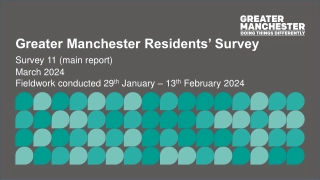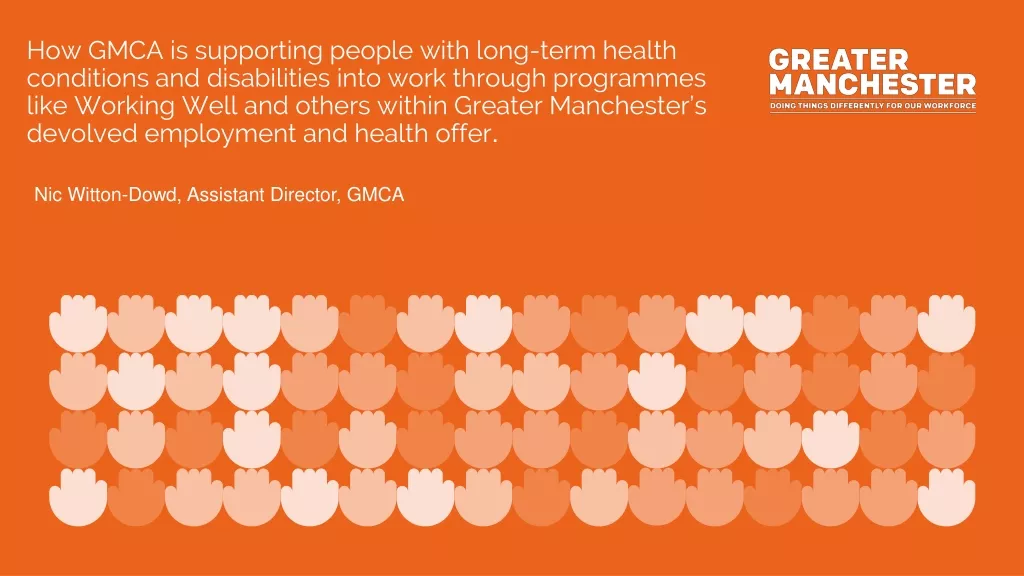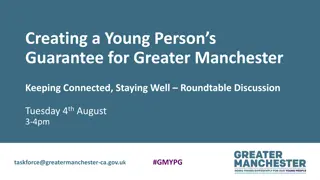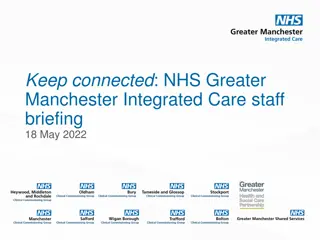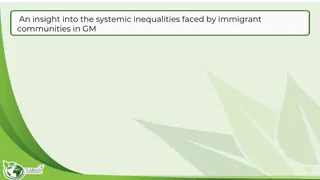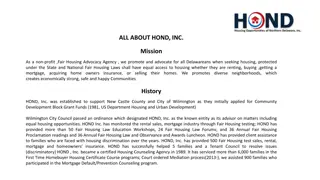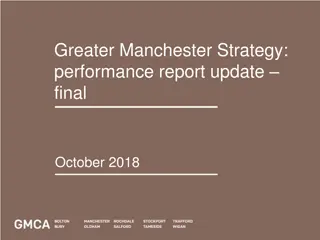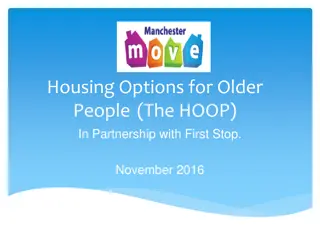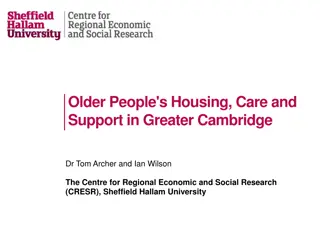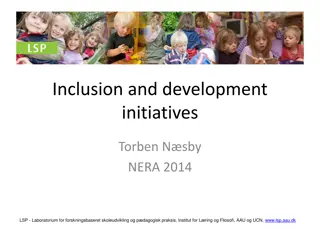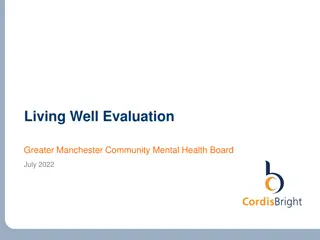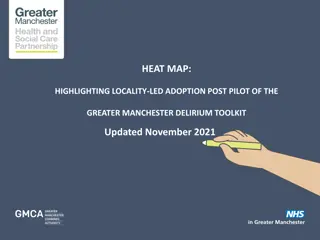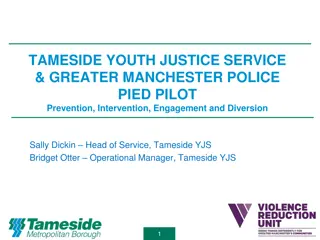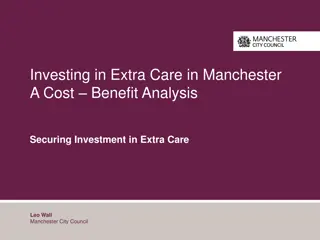Digital Inclusion Pilot for Social Housing Residents in Greater Manchester
Digital inclusion pilot in Greater Manchester aims to address the digital divide among social housing residents through collaborations between housing providers, Internet Service Providers, and local authorities. The project involves testing sustainable solutions, optimizing roles of stakeholders, and determining the best outcomes for target groups. Emerging findings highlight challenges and learnings from pilot programs across different housing providers in the region.
Download Presentation

Please find below an Image/Link to download the presentation.
The content on the website is provided AS IS for your information and personal use only. It may not be sold, licensed, or shared on other websites without obtaining consent from the author.If you encounter any issues during the download, it is possible that the publisher has removed the file from their server.
You are allowed to download the files provided on this website for personal or commercial use, subject to the condition that they are used lawfully. All files are the property of their respective owners.
The content on the website is provided AS IS for your information and personal use only. It may not be sold, licensed, or shared on other websites without obtaining consent from the author.
E N D
Presentation Transcript
1 Get Online Greater Manchester: digital inclusion pilot for social housing residents John Steward, Head of Digital Infrastructure, Greater Manchester Combined Authority #FixTheDigitalDivide
Get Online Greater Manchester: digital inclusion pilot for social housing residents 2 2 1. How far can the market stretch commercially to provide a long term sustainable solution to address digital exclusion in social housing? 2. What is the optimum role of the social housing provider working with the Internet Service Provider and the local authority to make it work? 3. Which solutions deliver the best outcomes for our target digitally excluded groups (over 75s, disabled people and young people)? 4. What might a sustainable model for Greater Manchester-wide roll out need to include e.g. standardising wayleaves to maximise investment and competition etc.? 5. Where are public funding interventions needed because of market failure? 6. Evidence base for action
3 3 Digital inclusion pilot for social housing residents Social Housing Provider ISP for Pilot Size of portfolio Pilot size Property Type Target Group 14,000 1,000 Multi Over 75s & Care Wythenshawe Housing Virgin Media leavers 18,000 1,000 Multi Mix Bolton at Home Hyperoptic 12,000 1,000 Multi Mix, incl. disabled Stockport Homes BT / Openreach groups 22,000 1,000 Single Unemployed groups Wigan and Leigh Housing Talk Talk / Freedom Fibre 6,000 1,000 Single Young People Southway Homes Vodafone TOTAL 72,000 5,000 TOTAL IN GM 203,000
4 Programme timeline From Mid 2023 SEPT 2022 OCT to DEC 2022 JAN - MARCH 2023 DEC 2021 JAN 2022 Full model testing with implementation of connectivity and digital inclusion programmes Development of expressions of interest to drive demand with close working between ISP and Housing Provider to maximise take up. Connectivity is in place in each pilot area. Large scale roll out across GM Social Housing Providers Research / Learning commission Pilot partner s in place Agreement of standardised Wayleave and specification to inform wider roll out Programme launch Offers finalised Development of digital inclusion safety net Research evaluation by end of March
5 Digital inclusion pilot for social housing residents: Emerging Findings OFFERS AND ACTIVITIES INCLUDES: EMERGING CHALLENGES IDENTIFIED INCLUDES: EMERGING LEARNING INCLUDES: Social Housing Provider / ISP Wythenshawe Housing with Virgin Media/O2 Connection of Community Hubs to promote offers Wayleaves and standard specifications to increase speed on connectivity roll out Role of social housing providers in use of digital infrastructure to manage its portfolio and keep tenants safe. Bolton at Home with Hyperoptic Volunteer support from ISPs Stockport Homes with BT/Openreach Social Tariffs APIs / How can we target particular groups without data? Role of health services Targeted reduced Tariffs Wigan and Leigh Housing with Talk Talk/ Freedom Fibre Impact of Cost of living crisis on pilot approach and cross links with other utilities including energy. Skills / confidence support Wider data sharing Southway Homes with Vodafone Capacity of SHPs to manage implementation Need for digital infrastructure expertise pool for SHPs to access
6 GM Pilots will determine what a sustainable model for digital inclusion for social housing providers looks like.. ISP ISP Responsible Business Commercial Opportunity Social housing pilots Housing provider services /Local authority services/ Gov t Intervention
7 Social Housing Provider Insights Simeon Yates, Belinda Tyrrell, Rebecca Harris, Gianfranco Polizzi, Jeanete D Arcy University of Liverpool
8 Update on research work so far Social Housing Providers Interviews with key colleagues in all 5 areas Focus groups or individual interviews with residents in all 5 areas Good insights but recruitment numbers varied Reviewing plans for further groups Residents online survey ready to go Some roll out with focus groups Further roll out over Christmas and New Year ISPs Interviews with ISPs planned for January Invitations to go out shortly Survey and focus group analysis for close of January
9 Other related developments National and Welsh Minimum Digital Living Standard measures (MDLS) Fieldwork complete MDLS to be published close of January/early February 2023 National MDLS survey Fieldwork from February 2023 Results and geodemographic mapping in April 2023
10 Initial findings for Social Housing Providers Operational issues Operational issues related to DI crosscut across the organisational structure of the providers. Touch points for DI issues within the organisation may included: IT Department Customer Service Teams (covering enquiries including rent etc), Customer Engagement Teams Facilities/Asset Management Teams (cabling etc). Digital inclusion responses need to link across multiple functions in social housing provider organisations.
11 Initial findings for Social Housing Providers All providers have already been addressing digital inclusion Stockport for example had previously offered social tariffs, fitted tower blocks with reduced cost broadband and fitted out a void property within the block to provide training (also seen as helpful in reducing social isolation) All providers noted the challenge of providing long-term support. Finance is often fixed term as maybe access offers (data, reduced cost broadband) Sustainability remains a key issue More than just digital Lots of offers by Social Housing Providers either directly offer or are connected to a range of community-based provision. These include things like skills and employability, activities to address loneliness etc. There is a recognition that tackling digital inclusion isn t just about devices or cabling in the walls, its about giving people opportunities to connect with other, access services and support.
12 Initial findings for Social Housing Providers Frontline realities A real commitment from the Social Housing Providers to address digital inclusion issues However Providers and their staff are key frontline service for their tenants Many tenants are feeling some of the most profound effects of the cost of living crisis. Colleagues within the organisations are dealing with these issues alongside digital inclusion: setting up warm hubs trying to identify the appropriate benefits/support to alleviate the effects of the cost of living/energy crisis
13 Initial findings for Social Housing Providers Role of GM very positive Benefits of working with GM on this have included their ability to provide more direct access to the ISPs particularly their senior teams who can influence the development of social tariffs, deployment of infrastructure (e.g cabling) and sharing expertise. Having GM as an ally in discussions with other organisations was very helpful Relationships with ISPs is varied and complex The test and learn element of working with different ISPs is understood. There were questions about how best to match ISPs (or ISP offers) to specific social housing providers and their tenants Rationale for current matching was not full clear to the Housing Providers Argument that issues around type of housing stock, types of tenants, tenant needs should form part of the rationale. The availability (being able to have discussions) and flexibility of the ISPs (meeting the tenants needs) is seen as key to making longer-term solutions work for the Housing Providers.
14 Initial findings for Social Housing Providers The Housing Providers hope that working together on the pilot will give them the opportunity to share experiences, knowledge and good practice with their peers. This was seen as a key benefit of this pilot project. The information being gathered as part of surveys and focus groups has potential importance to the Housing providers wider business planning. They want to make sure that they are offering their services in the best way possible to meet their clients needs There is a recognition that no all tenants will have the motivation or capacity to engage digitally. Identifying clear aims and methods for the pilot and methods of reporting back issues to GM Taskforce for resolution, is seen as important both in terms of the successful delivery of the pilot and balancing the pilot within the wider service delivery portfolio of activity the Housing providers.
15 Initial findings for Social Housing Providers We should note that nearly all providers have in past or are currently exploring other routes to providing tenants with digital access. As noted above addressing digital inclusion is on all the providers agendas, therefore they are looking at multiple solutions. The current ISP offers/opportunities are therefore not the only options they are exploring. Especially as offers may be fixed term Some offers fit some tenant groups better Other solutions (e.g. Alt-nets) might provide longer-term solutions
16 Initial findings from focus groups Offers need to fit tenant needs. Mobile only best for younger people Broadband better for older people Mixed awareness of social tariffs Not all groups aware they exist Not all people aware they could benefit Concerns over fairness of access (who can / who can t use) Concerns over practicalities (hassle of making changes): Changing telephone numbers Swapping contracts Worries about contract lengths/commitments
17 Initial findings from focus groups Interplay of physical and digital resources Respondents described dependence on: Digital health access (online prescriptions / GP contact) due a lack of local facilities (e.g. pharmacy) with practical travel distance. Social contact and enjoyment through social media or TV subscriptions again due to lack of meaningful local facilities or ability to travel Several spoke of frustration with access to services (e.g. GP, Local Government) as these were only via online One noted they have given up contacting health care Evidence of very specific needs for some community members Parents of children with special educational needs Disabled and long-term unwell
18 Initial findings from focus groups Well known issues remain: Confidence and motivation Older residents see limited value of being online (Note points about lack of local facilities and resentment at having to do things online) Though knowledge of benefits and opportunities may also be limited for some tenants Skills Most who are online are self taught Reliance on friends and family for help Understanding Not all Lots of evidence that focus needs to be on households not individuals Both parent and child needs Care giver and person cared for Households reported needs outstripping low-cost broadband provision
19 UoL team reflections Complexity on the ground Though lots of themes and issues are the same they articulate in quite different ways for different groups Can t disconnect local physical infrastructure from tenant s digital needs Pressures on front-line support staff Cost-of living crisis a major issue A social tariff offer may not be enough on its own Needs to work with local provision But see point above how to integrate this into tenant support Some offers better for some communities How to target social tariff offers? Needs to consider household composition 5 member household with 3 in school may push data or broadband allowances
20 UoL team reflections How attractive is a social tariff for target groups? (anecdotally) functional social tariff may not be attractive If all it gives you is access to services not broader social access and entertainment - then why pay even 15. (anecdotal) corroboration of Stockport and Ofcom survey data that 15 social tariff price point is too high for many tenants who are not online or mobile data only


